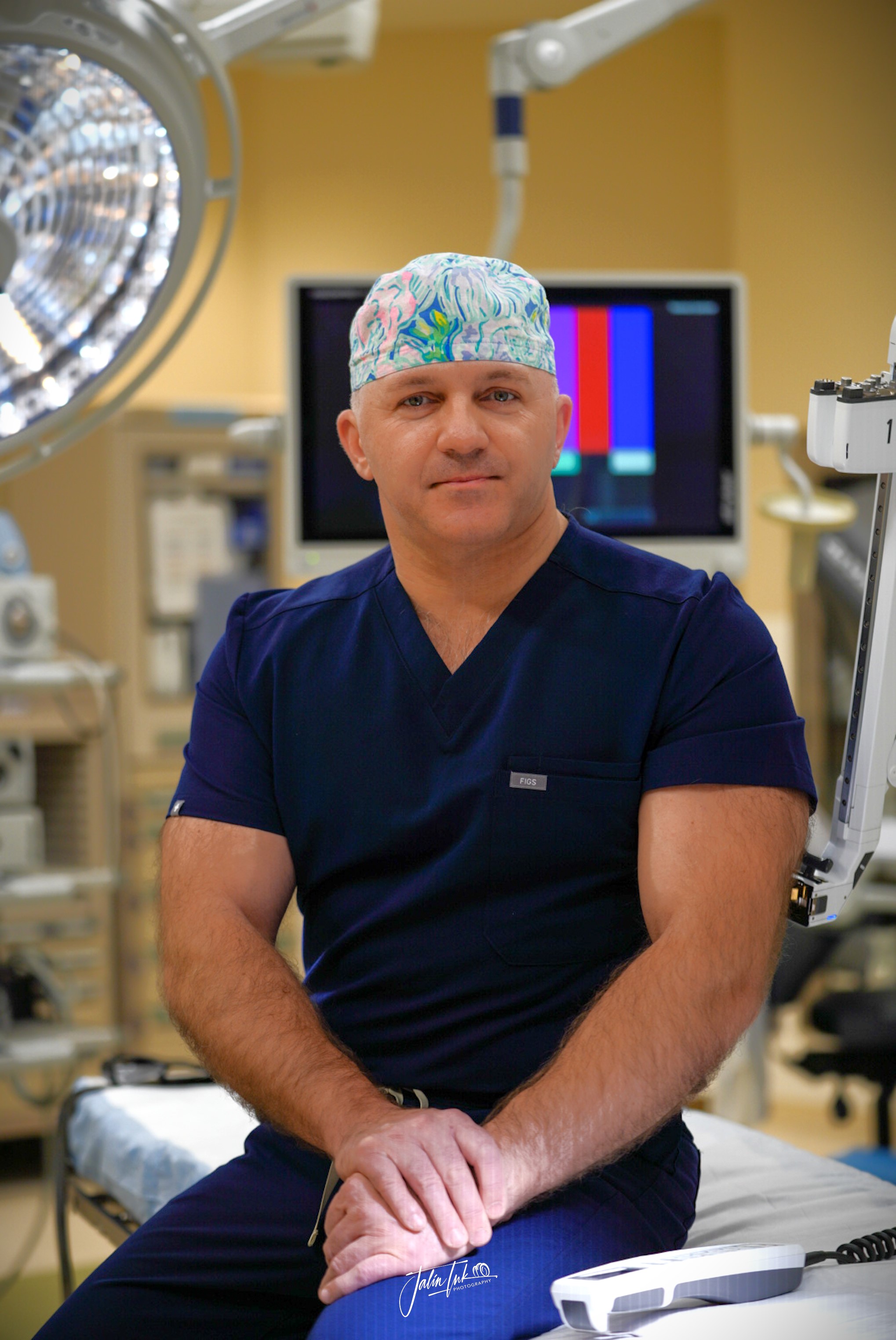For more information, contact Community Relations at:
04/01/2024
All about robotic bariatric surgery: Q&A with Dr. Dmytro Havaleshko
Dmytro “Dima” Havaleshko, MD, FACS, DABS-FPMBS, FASMBS, is the chair of the robotic surgery committee and director of the Center for Weight Management and Bariatric Surgery at Wentworth-Douglass Hospital. He has performed over 1,800 robotic surgeries, helping thousands of patients with obesity achieve better health, sustainable weight loss, and healthier lifestyles. Since he became the director of the Center for Weight Management in 2017, all bariatric surgeries have been performed with the most advanced da Vinci Xi robotic system.
Dr. Havaleshko answers what robotic bariatric surgery is, what patients who undergo these procedures can expect, and who would be a good candidate for bariatric surgery.

What is robotic bariatric surgery and how does it differ from traditional bariatric surgery?
When some people hear the term “robotic surgery,” they might think of a robot autonomously performing the procedure. This is not the case. Rather, the surgeon fully controls all three robotic hands and the camera throughout the entire surgery. Every action is performed by the surgeon with the assistance of a highly sophisticated computer.
Robotic surgery, also known as robot-assisted surgery, involves using advanced robotics to enhance surgical precision and capabilities. Unlike traditional open or laparoscopic surgery where the surgeon operates next to the patient, robotic surgery allows the surgeon to sit at a console and perform the procedure by controlling highly advanced robotic arms. This technology extends the surgeon's reach and dexterity, enabling more precise and minimally invasive techniques.
Robotic bariatric surgery is fully digitalized: the surgeon’s movements are recorded and analyzed. This approach allows for data that can provide insights for potential improvements and innovations.
Which weight loss surgeries can be performed with robotic assistance? Is it safe?
Any bariatric procedures traditionally performed through open or laparoscopic modalities can now be done robotically. These procedures include sleeve gastrectomy (gastric sleeve surgery), Roux-en-Y gastric bypass, duodenal switch surgery, SADI-S, gastric band removals, and revisional surgeries.
Robotic bariatric surgery is a safe option that can effectively reduce or reverse the risk of various health issues associated with obesity, including type 2 diabetes, heart disease, hypertension, high cholesterol, and obstructive sleep apnea. Our modern systems allow for much better visibility of the surgical area, as surgeons can see a detailed, high-definition 3D view inside the body, often with up to 10 times magnification. These procedures also carry a lower risk of infection, pain after surgery, and blood loss when compared to open surgeries.
What are the benefits of robotic weight loss surgery?
There are many benefits to robotic weight loss surgery.
Reduced risk of complications:
- Robotic surgery is less invasive, using four small incisions that are each less than half of an inch long instead of one large abdominal incision. This approach means:
- Less pain and scarring
- Lower risk of significant blood loss and other surgical complications
- Faster recovery
- Reduced need for strong pain medications or other prescription medicines after surgery—60% to 70% of our patients manage their pain with Tylenol
Enhanced surgical precision:
- The surgeon’s movement via robotic arms is incredibly precise, as the arms provide enhanced agility and flexibility. This requires less energy to perform tasks efficiently with even greater range of motion compared to human hands
- The robotic camera provides a clear, high-definition 3D view of the surgical area with up to 10 times magnification
Added safety features:
- The robotic system performs automatic calculations to reduce human error, such as eliminating tremors and accurately determining the required force for handling different types of tissues
- The system alerts the surgical team to replace the instruments after 10 uses, ensuring that the tools used during operations are always in peak condition
Who is a good candidate for robotic weight loss surgery?
Anyone who is eligible for open or laparoscopic surgery is also a candidate for robotic weight loss surgery, including patients requiring revision surgery. Generally, bariatric surgery is an option for anyone who has struggled with managing their weight and/or weight-related medical conditions through diet and exercise alone. Insurance companies in the U.S. will cover bariatric surgery for patients with a body mass index (BMI) over 35 and with weight-related medical conditions such as sleep apnea, type 2 diabetes, PCOS, or infertility. Patients with BMIs over 40 qualify for bariatric surgery regardless of comorbidities. Recent trends show some insurers extending coverage to those with BMIs over 35 without specific comorbidities, and even to patients with BMIs over 30 if they have weight-related health issues.
Our team works with all patients to ensure their surgery is safe and successful. For patients who do not immediately qualify for bariatric surgery (for example, if they have severe sleep apnea or uncontrolled diabetes), we work with them on pre-operative medical optimization to improve their eligibility.
What is the recovery process after robotic bariatric surgery?
The recovery process after robotic surgery is much faster compared to open surgery. Many patients can go home the morning after their surgery and manage any discomfort with over-the-counter pain medicine. Depending on the procedure, patients generally return to everyday activities within one to three days. Most importantly, the Center for Weight Management team will monitor patients with regular follow-up appointments for life.
What results can I expect with bariatric surgery?
For most patients, bariatric surgery, whether performed robotically, laparoscopically, or via open surgery, is highly effective in helping them lose and maintain weight loss when combined with healthier eating habits and regular exercise. Many patients who previously had conditions like acid reflux disease or type 2 diabetes are completely cured following weight loss surgery.
If you are considering bariatric surgery, we recommend starting the discussion with your primary care provider. If you and your doctor decide that surgery is the right choice for you, please contact our team at the Wentworth-Douglass Hospital Center for Weight Management by registering for a free info session or calling 833-936-3963.
Tagged In: